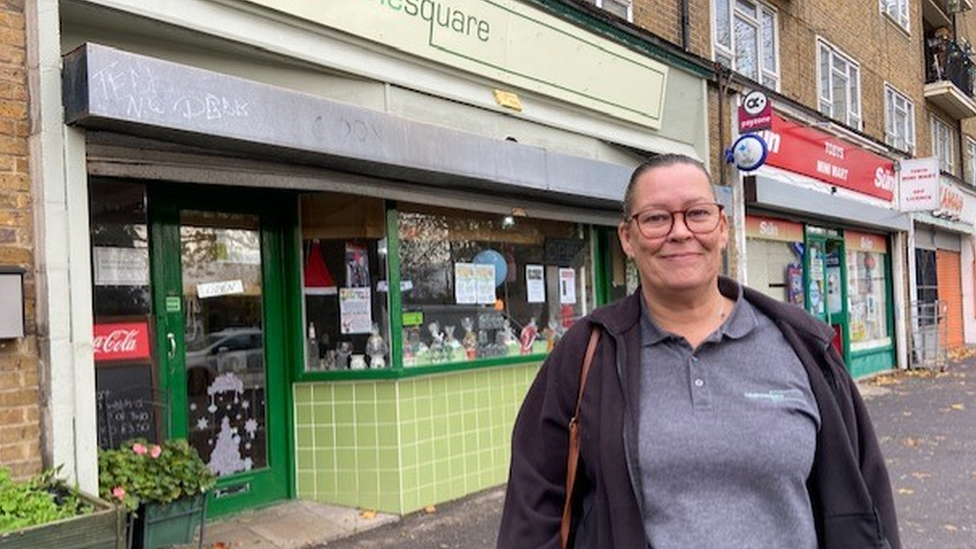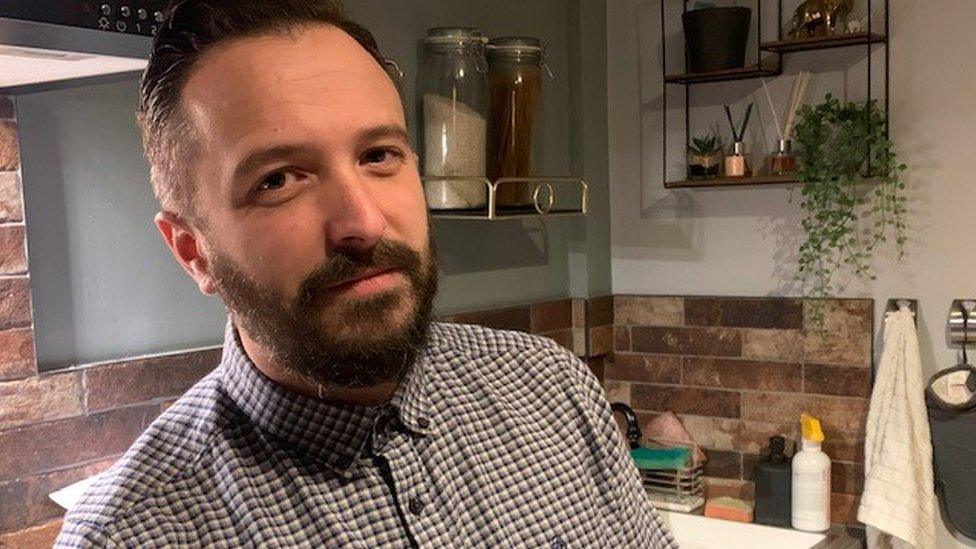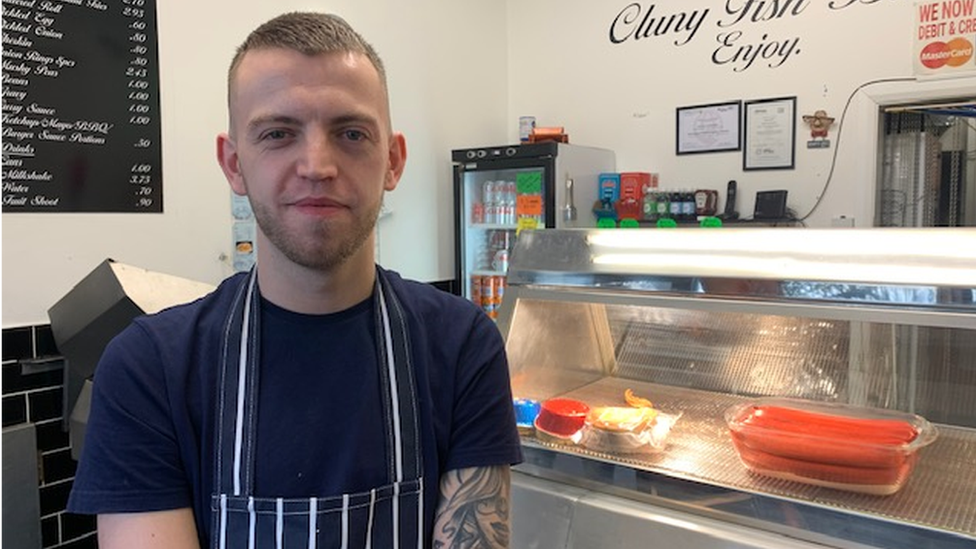Autumn Statement: Relief for some, but energy fears still loom
- Published

Wendy was overjoyed by the changes announced in the statement
As the government delivered its Autumn Statement, locals in Southend-on-Sea were anxiously figuring out what it meant for them. For some, the changes represent a welcome respite, but for others the cost of living crisis has already taken a heavy toll.
It's a drizzly, grey day in Cluny Square. The streets in this small community are quiet, with just a few people popping into the local charity shop, or taking their children to play in the park.
The square comprises a strip of shops and houses, while a tower block looms over it. It's home to a high number of pensioners and low income families, many of whom rely on benefits.
Residents here have been hit hard by recent price rises, says Wendy Wilson, 51, who runs the square's community café. Prices are kept as low as possible, with a full English Breakfast costing just £2.80, but chatter among customers often centres on the struggle to make ends meet.
Wendy was braced for the worst from the Autumn Statement, on Thursday. A single mum who works on the minimum wage, she recently gave up her beloved pet dogs for adoption. She was worried that as prices and bills spiralled, she wouldn't cope.
'It's help for people who need it'
But Wendy says she was "overjoyed" by Chancellor Jeremy Hunt's announcement. His changes mean her hourly wage will go up to at least £10.42, from April, while her Universal Credit payments will rise in line with inflation.
As she lives with her 11-year-old son in a housing association flat, her rent rise will be capped at 7%. Energy prices are still a concern. She says her son offered to give his pocket money back after watching her diligently switch everything off at home to save electricity.
But the £900 cost of living payments promised by the chancellor feel like a lifeline, she says. "The energy prices going up still scares me. But that £900 is going to help, by how much I don't know, but it's all looking positive."
"Everybody around here thinks the same," she adds, "that this is what we need, help for the people that need helping, not just the top dogs."

Adam says he and his family have already made sacrifices
However, the government's plans weren't as positive for college lecturer, Adam Weaver, 33. He lives in Cluny Square with his partner, Cathy, a fellow lecturer, and their three young children.
Cathy teaches gymnastics and trampolining on the side for extra income, while the family has already made lifestyle sacrifices.
"We very rarely go out to eat anymore and if we take the kids out it tends to be to the park and stuff. I can go to the pub maybe once a week and have a couple of pints, but the next thing to go will be that," he says.
The Weaver family - who have been through a decade of below-inflation salary rises - won't benefit from increases in the minimum wage, or be shielded from the end of the energy price cap.
And if they do start getting paid more, the freezing of National Insurance and income tax thresholds until 2028 means the couple will likely have to pay thousands of pounds more in tax in the coming years,
But Adam is broadly positive about the announcements, saying he feels they are right for society as a whole. "It's good to see they've taken on policies where those who have taken on really high profits will be used to subsidise people on really low incomes," he says.
"I don't mind paying a bit more in tax providing my bills don't get astronomically worse."

Jack doesn't feel the government has done much for him
Jack Van Looy, 25, runs Cluny Square's fish and chip bar. He used to own the business but he sold it due to cost of living fears, staying on as the manager.
"Prices were going up, expenses, and I just couldn't afford to keep it going," he says. "It's very hard to survive. My mum is working three jobs just to get by. We're hanging in there but with everything going up, I don't know how much longer we can go on for."
The increase in the national living wage will give Jack a boost, but he says that's still "only a small jump considering the big jump in bills".
The shop's rent has shot up in recent years, as has the wholesale price of fish and oil. It means the prices the shop charges customers will soon have to rise for the second time in six months, which local residents are sensitive to.
"How can customers afford to come in, living on minimum wage?" he adds. "Everyone's going through the same issues, the same problems."

How does the Autumn Statement affect you? You can share your experiences by emailing haveyoursay@bbc.co.uk, external.
Please include a contact number if you are willing to speak to a BBC journalist. You can also get in touch in the following ways:
WhatsApp: +44 7756 165803, external
Tweet: @BBC_HaveYourSay, external
Or fill out the form below
Please read our terms & conditions and privacy policy
If you are reading this page and can't see the form you will need to visit the mobile version of the BBC website to submit your question or comment or you can email us at HaveYourSay@bbc.co.uk, external. Please include your name, age and location with any submission.
